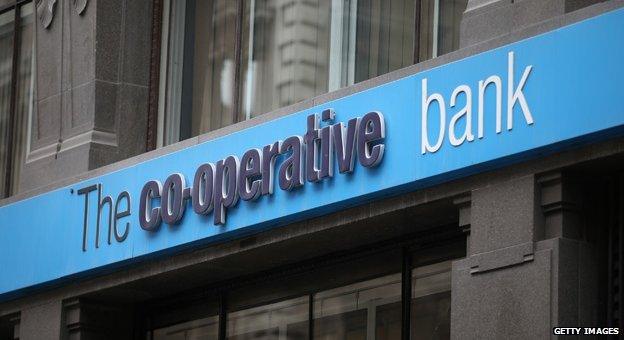What went wrong at the Co-op Bank?
- Published
- comments

As a sobering assessment of missed warnings, leaders that could not see the wood for the trees and a failure of governance at a bank that very nearly went bust, Sir Christopher Kelly's report on the debacle at the Co-op Bank will take some beating.
As the BBC revealed last week, the Kelly report says the root cause was the attempt to take over the Britannia Building Society. Sir Christopher says the merger "should probably never have happened", a view that could equally legitimately be taken about Lloyds Bank's takeover of Halifax Bank of Scotland. Or the Royal Bank of Scotland's calamitous attempt to buy ABN Amro.
The Co-op saw Britannia as an easy route to retail customers and a ready-made branch network. It received into the bargain a mass of commercial property assets "outside its risk appetite", according to Sir Christopher. Britannia had loan-to-value ratios - a key test of the stability of a bank - that should have made the board wince. Due diligence was "cursory" and what is known as the "fair value adjustment" - reporting the true value of assets and liabilities at the time of the deal - proved "woefully inadequate". It estimated a £284m adjustment downwards. The actual figure was later revealed to be £802m.
Sir Christopher says "the Regulator did not object" to the deal. Why the Financial Services Authority kept quiet is a reasonable question, given that it had put Britannia on its own private "watch list" as an organisation in trouble.
The report says that on capital "forecasting and planning" were poor at the Co-op, the bank's board was "ill-informed" and managing day-to-day budgets appeared more important than ensuring a healthy balance sheet. Key executives had little or no banking experience, Sir Christopher says. The person put in charge of the bank's strategy post-merger was an expert in human resources.
On top of the bank's struggles to integrate the Britannia, the Co-op Group Board applied two further stresses - Project Unity, to bring together functions at the Co-op Group and the bank; and an attempt to buy 632 branches owned by Lloyds Bank. It was like attempting to fit after-burners on a Trabant.
Sir Christopher touches on the culture of the Co-op, a section of the report which should be required reading for any budding management gurus out there. His report says there was a willingness to accept poor performance, a tendency to promote good news over bad and a dislike of challenge. Niall Booker, the present chief executive of the Co-op Bank, insists that that culture is changing.
After its near collapse and restructuring, the Co-op Bank was bought by a number of American hedge funds and Co-op Group's stake fell to 30pc. Attention will now turn to the lessons in Sir Christopher's report for the Group, which has its key annual general meeting on May 17.
What it says of governance will be the key. Will members be convinced by Sir Christopher's finding that "the methods used over the last few years to appoint members of the board have led to serious failures". Will they vote through governance reforms? Many argue that the future of the Group hangs on reform and that the banks which are supporting the Co-op Group despite quite eye-watering losses will demand action. Sir Christopher's report is likely to strengthen the resolve of those who argue that without reform, Co-op Group will not have the tools to fix itself.